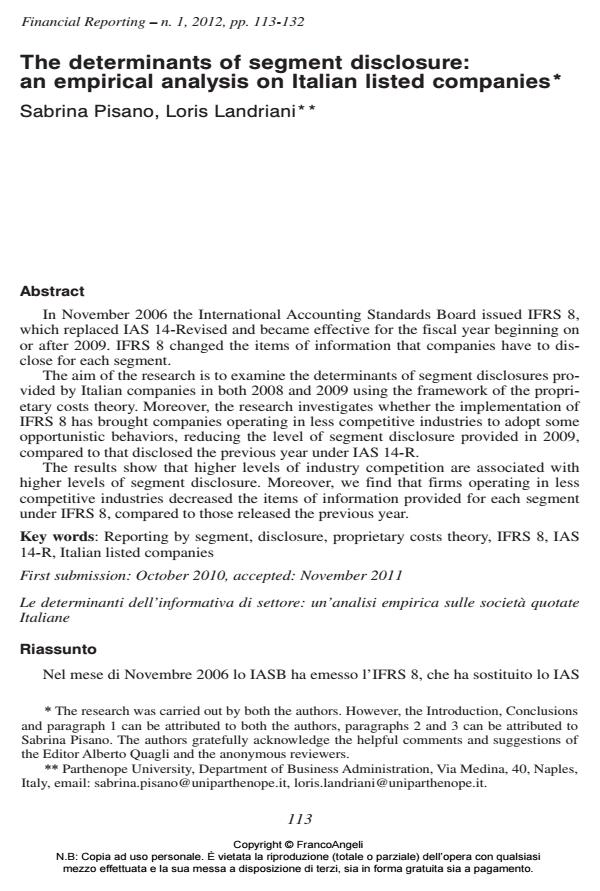The determinants of segment disclosure: an empirical analysis on Italian listed companies
Journal title FINANCIAL REPORTING
Author/s Sabrina Pisano, Loris Landriani
Publishing Year 2012 Issue 2012/1 Language English
Pages 20 P. 113-132 File size 543 KB
DOI 10.3280/FR2012-001005
DOI is like a bar code for intellectual property: to have more infomation
click here
Below, you can see the article first page
If you want to buy this article in PDF format, you can do it, following the instructions to buy download credits

FrancoAngeli is member of Publishers International Linking Association, Inc (PILA), a not-for-profit association which run the CrossRef service enabling links to and from online scholarly content.
In November 2006 the International Accounting Standards Board issued IFRS 8, which replaced IAS 14-Revised and became effective for the fiscal year beginning on or after 2009. IFRS 8 changed the items of information that companies have to disclose for each segment. The aim of the research is to examine the determinants of segment disclosures provided by Italian companies in both 2008 and 2009 using the framework of the proprietary costs theory. Moreover, the research investigates whether the implementation of IFRS 8 has brought companies operating in less competitive industries to adopt some opportunistic behaviors, reducing the level of segment disclosure provided in 2009, compared to that disclosed the previous year under IAS 14-R. The results show that higher levels of industry competition are associated with higher levels of segment disclosure. Moreover, we find that firms operating in less competitive industries decreased the items of information provided for each segment under IFRS 8, compared to those released the previous year.
Keywords: Reporting by segment, disclosure, proprietary costs theory, IFRS 8, IAS 14-R, Italian listed companies
- Capital market effects of mandatory IFRS 8 adoption: An empirical analysis of German firms Nina Franzen, Barbara E. Weißenberger, in Journal of International Accounting, Auditing and Taxation /2018 pp.1
DOI: 10.1016/j.intaccaudtax.2017.11.002 - Network, Smart and Open Sabrina Pisano, Luigi Lepore, Assunta Di Vaio, Loris Landriani, pp.257 (ISBN:978-3-319-62635-2)
- Emerging Market Firms in the Global Economy Helen Kang, Sidney J. Gray, pp.233 (ISBN:978-1-78441-066-7)
- Potential of IFRS 8: Managerial "customization", relevance of subsidiaries and separate financial statements Andrea Cuccia, in FINANCIAL REPORTING 1/2018 pp.103
DOI: 10.3280/FR2018-001004 - Response of the EAA FRSC to the EFRAG/ANC/FRC Discussion Paper:Towards a Disclosure Framework for the Notes Richard Barker, Elisabetta Barone, Jacqueline Birt, Ann Gaeremynck, Anne Mcgeachin, Jan Marton, Rucsandra Moldovan, in Accounting in Europe /2013 pp.1
DOI: 10.1080/17449480.2013.772715 - IFRS 8 and VALUE RELEVANCE: EVIDENCE FROM TURKISH LISTED COMPANIES Sezer KÜLAH, Cemal İBİŞ, in Journal of Research in Business /2022 pp.123
DOI: 10.54452/jrb.1030110 - From IAS 14 to IFRS 8: the role of proprietary and agency costs in shaping financial reporting Ana Gisbert, Begoña Navallas, Domi Romero, in Spanish Journal of Finance and Accounting / Revista Española de Financiación y Contabilidad /2024 pp.1
DOI: 10.1080/02102412.2024.2329502 - From IAS 14 to IFRS 8: the Role of Proprietary and Agency Costs in Shaping Financial Reporting Ana Gisbert , Begoña Navallas, Domi Romero, in SSRN Electronic Journal /2024
DOI: 10.2139/ssrn.4752945 - Il reporting per segmenti nei settori del trasporto pubblico locale e della cura della salute. Esperienze a confronto Domenico Nicolò, Giuseppe Valenza, in MANAGEMENT CONTROL 1/2020 pp.35
DOI: 10.3280/MACO2020-001003 - New Metropolitan Perspectives Maria-Gabriella Baldarelli, Domenico Nicolò, pp.101 (ISBN:978-3-030-52868-3)
- Intensive Board Monitoring, Investor Protection and Segment Disclosure Quality: Evidence from EU Sameh Kobbi-Fakhfakh, Ridha Mohamed Shabou, Benoît Pigé, in Accounting in Europe /2020 pp.52
DOI: 10.1080/17449480.2019.1646427 - L’effet des caractéristiques du conseil d’administration et du comité d’audit sur la qualité de l’information sectorielle publiée Sameh Kobbi-Fakhfakh, in Vie & sciences de l'entreprise /2017 pp.97
DOI: 10.3917/vse.203.0097 - The impact of IFRS-8, segment reporting, on the disclosure practices of Polish listed companies Sandra Janet Cereola, Joanna Dynowska, in Journal of International Accounting, Auditing and Taxation 100466/2022 pp.100466
DOI: 10.1016/j.intaccaudtax.2022.100466 - The Impact of Segment Reporting Under the IFRS 8 and SFAS 131 Management Approach: A Research Review Nancy B. Nichols, Donna L. Street, Ann Tarca, in Journal of International Financial Management & Accounting /2013 pp.261
DOI: 10.1111/jifm.12012 - The adoption of IFRS 8 – no headway made? Evidence from segment reporting practices in Germany Nina Franzen, Barbara E. Weißenberger, in Journal of Applied Accounting Research /2015 pp.88
DOI: 10.1108/JAAR-05-2013-0037
Sabrina Pisano, Loris Landriani, The determinants of segment disclosure: an empirical analysis on Italian listed companies in "FINANCIAL REPORTING" 1/2012, pp 113-132, DOI: 10.3280/FR2012-001005